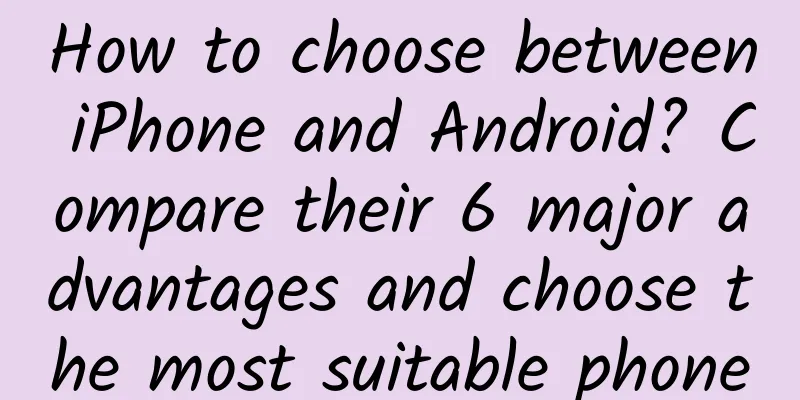How to choose between iPhone and Android? Compare their 6 major advantages and choose the most suitable phone

|
You've probably all been torn between the iPhone and Android when it comes to choosing a phone, especially as both operating systems gear up for big releases every year. Of course, no matter what you buy, the phone you buy will have one of the great mobile operating systems: iOS (if you choose an iPhone) or Android (if you choose another model).
After more than ten years of development, both system platforms are now quite mature. They both have rich functions, and there is almost nothing that one can do that the other cannot. However, each system has its advantages and disadvantages, which may be the reason why you are not sure about the choice. Here we compare the pros and cons of iPhone and Android in detail, so that you can fully understand the respective advantages of each mobile phone platform, so that you can make a better choice when buying a mobile phone. Why is it better to choose iPhone?1. Have a good ecosystemWhen you buy an Apple product, you own the Apple ecosystem. This may seem like a simple reason, but Apple relies on a wider range of high-tech products, and if you already own a Mac, iPad, or Apple Watch, then buying an iPhone makes a lot of sense. Apple designs its products with continuity features that make it very easy to transfer work and data from one of its devices to another, which can save you even more time. Like camera continuity, it allows you to take photos and scan documents with your iPhone's camera, then view and edit them on your Mac. You can even use biometric authentication on your iPhone with Apple Pay to complete purchases on your Mac while you wait. Only a handful of Android phone makers have hardware ecosystems that come close to Apple's, and even those that do a good job, like Samsung, can't quite reach the level of the iPhone and other Apple-built devices. Microsoft is helping Google close the gap with its new Your Phone app for Windows, which lets Android users receive texts and notifications on their PCs, but the experience is somewhat rudimentary and still has a lot of work to do. There are many other great examples of continuity across iOS, iPadOS, watchOS, and macOS, and iPhone is a key component of continuity, especially now that iPhone apps can be seamlessly ported to macOS. Additionally, Apple is offering another opportunity to lock in with the new iPhone 12 and iPhone 12 Pro: wireless charging accessories. These magnet-based chargers, cases, and products only work with the latest iPhones, so if you bought one, it's going to cause some headaches if you choose to leave. 2. Third-party apps are betterThis one is definitely a personal preference, but as someone who has bounced back and forth between iOS and Android for as long as both platforms have existed, I have always been blown away by the quality of apps created by iOS developers and disappointed by most Android apps. There is great software and developers on Android, but they are hard to find in my experience. For example, one of our favorite Twitter apps, Tweetbot 5, is iOS-only; one of the best third-party Twitter apps we've encountered on Android, Fenix 2, pales in comparison. You might even find that apps from banks to airlines run smoother and more stable on iOS than on Android, and integrate better with your phone’s core services, like your wallet. 3. More accessories availableWhether in stores or online, you'll find a wide range of cases for every iPhone Apple makes. You won't be frustrated by your choice of accessories at any physical retail store. The selection and availability of iPhone cases, screen protectors, car mounts, and other goodies far exceeds that of any other phone, and that's important to most people. As someone who likes to change cases regularly to keep their phone looking fresh, I've been very disappointed by the lack of accessories for some Android phones, a problem that iPhone owners will never have. 4. No messy pre-installed softwareNo matter how you buy your iPhone, no matter when and where you buy it, no useless software will be pre-installed when you first start it up. This means that the iPhone's system is clean from the beginning and will not bring unnecessary trouble to your use. 5. Support for major software updatesTake the iPhone 6S, for example. It received support for iOS 14 despite originally launching with iOS 9 in 2015. For comparison, consider Samsung's Galaxy S6, which was released the same year and started with Android 5.0 Lollipop. Not only did it lack the latest Android software, but it stopped getting updates years ago. It was only able to get as far as version 7.0 when Samsung pulled support for it. More importantly, when a new iOS version is released, everyone can use it on the same day and at the same time, and it can be installed instantly on all models that support it. In contrast, Android versions are released by model, which causes a lot of inconvenience. 6. Better after-sales serviceSuppose something goes wrong with your iPhone and you need to repair it, or you want to put a protective film on the screen, and you want it to be done by a professional, who will stick it to the film without bubbles or dust spots. No matter what problem you encounter, it is very easy to find a service point. Android phone users cannot enjoy this treatment. If you need to replace the battery or replace the screen, you may have to send it back to the manufacturer if you want to seek manufacturer's service. Considering that we use mobile phones every moment, this will be a very troublesome thing. Most people will just find a repair point and fix it. Why is Android better?1. Android phones have a wider price range and offer more choices.The vast majority of smartphones in the world run Android, and since there are so many companies making Android phones, you can buy them in any price range. No matter how much you want to spend, you’ll be able to find an Android phone that fits your budget or offers exclusive features. This cannot be done for iPhones, which have always been expensive when released, and usually only get cheaper after several generations of older versions. For example, the cheapest new Apple phone, the iPhone 12 mini, is equipped with a small 5.4-inch screen. It has the same price as the Samsung S20 FE, but the Samsung S20 FE is equipped with a larger and smoother 120Hz 6.5-inch screen, a telephoto lens and a larger battery. While the cheapest iPhone Apple offers, the SE, is a great phone that doesn't cost too much, its design is dated and its screen is too small for some people. 2. Android phones are more customizableWhile both iOS and Android have evolved, Android has always been known for being a platform that can be customized and personalized. Starting with the home screen, it provides a lot of dynamic widgets and the ability to place apps anywhere on the page, while the iPhone has only now caught up with iOS 14. Android also lets you download third-party replacements for core services (like web browsers, keyboards, and media players) and set them as the default if you prefer third-party apps to the ones that come pre-installed on your phone. iOS has gotten better at this over the years, but it's still a ways off from Android's approach. Finally, we have to talk about the look of the phone. The user interface and Android system software that are customized by certain phone manufacturers have very useful features. Many users like custom software, such as Samsung's One UI or OnePlus' OxygenOS, because they have extra features, such as the ability to scroll screenshots and hide photos and videos in password-protected folders. 3. You can (sometimes) expand storageAlthough expandable storage is less popular these days, many Android phones still offer it, allowing you to use an SD card to store your photos without taking up space on your phone's own storage. Considering that Apple and other phone makers charge double or quadruple for cloud storage when you buy a phone, you could definitely buy a 512GB card instead of relying on the network's cloud space. 4. Some phones still have headphone jacksMany Android phones still come with headphone jacks, though the feature is becoming increasingly rare on high-end phones, a useful feature that Apple removed from its phones in 2016. For those who still love to use them, the trusty old wired headphones are still a good option. 5. With universal USB-CAndroid phones rely heavily on USB-C ports for charging and data transfer, which is very convenient if you only have to carry one charging cable when you go out. Apple's Lightning cable is a product of the era when every tech company was forced to develop its own proprietary connector, and USB-C represents the ideal single-port solution that the industry is working towards. It also opens the door to faster charging technology. For example, the OnePlus 8T only takes 15 minutes to charge from zero to 55% battery capacity. In 30 minutes, your battery will be charged to 93%. In contrast, the iPhone 12 still sticks with the Lightning port. Apple no longer even includes a charger in the box. Very convenient mobile functionality (with drag and drop support on PC). Most people don't need to go over the network to move files from their phone to their PC. When you plug your Android phone into your PC, you can easily drag and drop files into folders, just like a drive in that computer. This means your media library and documents are very easy to transfer and store locally. Some Android phones, like the Galaxy Note 20, even have special PC or display projection features that allow you to view and use the device as a desktop. Samsung's DeX interface is one such example. With this kind of versatility, a high-end Android phone can easily replace one of the best Chromebooks or similar ultraportable laptops. 6. Innovative features usually appear on Android phones firstClearly, Apple has been slower, or at least slower than Android, with many emerging technologies appearing first on Android phones. With so many companies developing Android phones, it’s no surprise that Android partners often beat Apple to market with innovations in the mobile space. Wireless charging, fast charging, NFC, 4G LTE, 5G, OLED screens, under-screen fingerprint sensors, waterproofing, and multi-lens cameras were all installed on Android phones before the iPhone, as were software breakthroughs such as true multitasking, copy and paste, and multi-window support, etc. Apple also came later than Android. Of course, this isn't to say that Apple hasn't had its own breakthroughs. Which one should you choose?So, iPhone or Android, which should you choose? Both platforms have advantages and disadvantages, and as with many purchasing decisions, your choice will depend on what you value most. Owning an iPhone is a simpler and more convenient experience. There's nothing to think about, and since Apple's iPhone represents the most popular smartphone brand, it's very convenient whether you want to replace the battery or just want to change the phone case. Android phones are weaker in these areas. However, Android phones offer greater freedom and give you more choices. Choose how much you want to spend, choose the hardware and software features, and choose how to organize and personalize your experience. If you are very committed to the technology you use, you may find Android more handy. Although you may also lament the relative lack of high-quality apps and accessories. If you're wondering which phone you should choose, compare the performance and specs of the best iPhones and best Android phones available today. Whatever phone you choose, make sure it's the right choice for you. |
<<: Android also has its own "Shortcuts" app
>>: Where is Alipay digital RMB? How to activate it? How to use digital RMB for payment?
Recommend
How to do SEO for a portal website? SEO ideas for local portals and vertical portals
Table of contents: 1. What is the difference betw...
Baidu Promotion: Tips for Ad Landing Pages with High Conversion Rates!
Party A: Why does my website have such a poor con...
Understand "World Traditional Medicine Day" in 80 seconds!
I am Dongdongmiao. World Traditional Medicine Day...
Electric Technology Car News: WEY VV7c is known as China's Porsche moving towards high-end. Has Great Wall thought about Zotye's feelings?
Since Great Wall Motors announced the launch of i...
Is it expensive to customize Yantai’s catering mini program? Yantai catering mini program customization cost and process
In order to better penetrate into various industr...
They have no money and no resources, and they are also chasing hot topics, so why can they create 100,000+?
This is an era of chasing hot spots, and everyone...
Everyone wants to make the next "The Debaters". Can it be done by moving the satellite TV's super variety show to the Internet?
There are more and more super variety shows movin...
Six techniques for attracting traffic from Weibo in the medical beauty industry
Recently, when I was communicating with some boss...
Tangyuan or Yuanxiao? Note that these 4 types of people are advised to eat less!
Today is the Lantern Festival. Are you ready to e...
Facing Skyworth's paper-thin OLED TV, can Hisense, which sticks to ULED, have the last laugh?
At present, the most intense competition in TV pa...
CEO goes to heaven, where is Nintendo on earth headed?
Nintendo recently issued a brief obituary: "...
Which one is better, negative keywords or exact negative keywords?
Through the search term report, we can see whethe...
These 4 overnight dishes are too dangerous. It is best to throw them away if you can't finish them.
It is said that "thrift is a traditional vir...
"Short video traffic diversion picture and text number" picture and text diversion gameplay is super simple, can be copied and matrixed
Training course video content introduction: Quick...
Lei Jun, Zhou Hongyi and other business leaders' success secrets courses
From ideals to successful entrepreneurship, Lei J...









